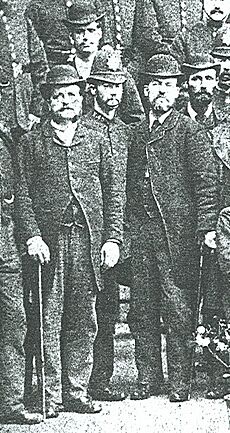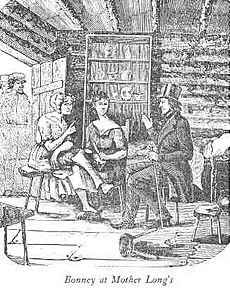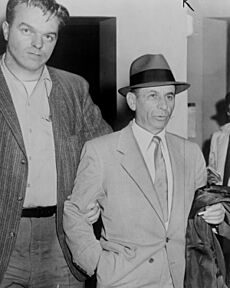Detective facts for kids
| Occupation | |
|---|---|
|
Activity sectors
|
Criminal investigation |
| Description | |
| Competencies | Criminological knowledge, knowledge of the law, literacy and numeracy, reasoning skills and social skills |
|
Education required
|
Secondary or tertiary education |
|
Fields of
employment |
Law enforcement or private investigation |
|
Related jobs
|
Police officer, private investigator, bounty hunter |
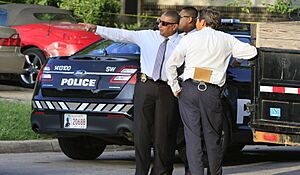
A detective is a special investigator. They are usually part of a law enforcement agency, like the police. Detectives gather clues to solve crimes. They talk to people who saw something or have information. They also collect physical evidence and check records. All this work helps them find criminals and bring them to court. A detective can work for the police or as a private detective.
Contents
What is a Detective?
In stories and movies, a detective is often someone who solves mysteries. They look at clues and old records to find out who committed a crime. They also try to find where criminals might be hiding.
In some police groups, you become a detective after being a regular police officer. You usually need to pass a special test. In other police systems, detectives might join directly after college. They don't always start as uniformed officers first.
Some people think detectives need different training than regular officers. This is because their job is very different. Others believe that being a uniformed officer first helps. It teaches them about police rules and gives them useful contacts.
Some detectives do not work for the government. They are called private investigators. People sometimes call them "PIs" or "private eyes."
How Detectives are Organized
Big police groups often have many detective teams. Each team works on a specific type of crime. This helps them become experts. Some common teams include:
- Homicide: Investigates murders.
- Robbery: Looks into thefts where force was used.
- Burglary: Investigates break-ins.
- Auto Theft: Finds stolen cars.
- Missing Persons: Searches for people who are lost.
- Fraud: Investigates scams and cheating.
- Computer Crime: Deals with crimes done using computers.
- Domestic Violence: Helps victims of violence at home.
- Arson: Investigates fires that were set on purpose.
In the United States, a regular detective often has the rank of "Detective." Their supervisors might have different ranks. In some other countries, detectives have ranks like "Detective Constable" or "Detective Sergeant." This means they have the same rank as uniformed officers, but with "Detective" added.
Private Detectives
Private detectives work for individuals or companies, not the government. They help solve problems like finding missing people or gathering information for legal cases. In some countries, what private detectives find might not be accepted as proof in court. Even so, many people still hire them. Private detectives usually follow a special set of rules for their work.
Citizen Detectives
A citizen detective is a regular person who tries to help solve crimes. They do this without getting paid. They are not part of the police or any official group. People become citizen detectives for many reasons. They might want justice for a friend or family member. They might also just really dislike crime.
Citizen detectives try to solve crimes in many ways. They might look at a crime scene or talk to people. They might also watch people who seem suspicious. Sometimes, they collect evidence or give tips to the police. They can also help the police by being witnesses. However, sometimes citizen detectives can accidentally make investigations harder. They might also do things that are against the law if they try to catch criminals themselves.
History of Detectives
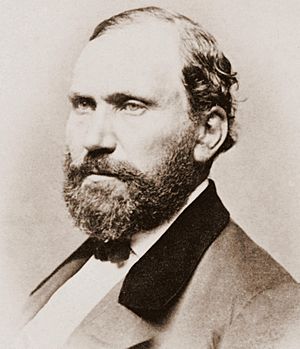
Before the 1800s, there were not many official police groups. The idea of special detectives came later. The first private detective agency started in Paris in 1833. It was founded by Eugène François Vidocq. He had been a criminal himself before leading a police group.
In England, early police detective work was done by groups like the Bow Street Runners. Later, the London Metropolitan Police started their own detective service. The first police detective unit in the United States began in Boston in 1846.
Detective Techniques
Street Work
Detectives use many ways to investigate crimes. Most cases are solved by talking to suspects and witnesses. This takes a lot of time. Detectives also use their network of informants. These are people who give them information. Informants often know people a detective cannot easily reach. Collecting and keeping evidence also helps find possible suspects.
Forensic Evidence
Physical evidence can give important clues to solve a case. Forensic science is using science to answer questions for the legal system. This can be for a crime or a civil case. Many large police stations have their own science labs. Other police groups hire outside labs to do this work.
Records Investigation
Detectives can use public and private records to learn about a person. Police detectives can search through fingerprint records. Police keep records of people who have committed serious crimes. Detectives might look at arrest records, photos of arrested people, hotel information, or phone records. They also check surveillance camera footage.
Detectives Around the World
United Kingdom
Before 2017, people in the UK had to be uniformed police officers for at least two years. Only then could they apply to become detectives. Since 2017, people can apply directly to be trainee detectives. UK police must also pass a special exam called the National Investigators' Examination. This helps them move forward to become qualified detectives.
United States
To become a police detective in the U.S., you first go to a law enforcement academy. This training gives officers a basic education. After the academy, officers get on-the-job training with an experienced officer. They also work for a trial period, usually one to two years.
During this time, the officer is supervised by a sergeant. Some police officers go to college to study criminal justice. You can also get special training in criminal investigation at some colleges.
After years of training or college, officers can take a test. This test checks their knowledge about investigations, talking to people, and collecting evidence. It also covers criminal law and court rules. Senior police officials give these tests. Based on the results, some officers are promoted to detective. Some police groups have different levels of detectives. Detectives can move up in rank after gaining more experience.
Private investigators need a license from the state where they work. Most states require this. To get a license, applicants must meet strict rules. This includes college education and two to four years of full-time investigation experience. They also need to pass a background check. Private investigators are allowed to do civil and criminal investigations in their licensed state. It is against the law for someone to do a criminal investigation without a license, unless they are police officers or lawyers.
See also
- Hotel detective
- Inspector
- Investigator (disambiguation)
- Law enforcement agency
- Police rank
- Private investigator
- Police
- Police officer
- Undercover operation
- Spy agent
- Special agent
- Detective fiction
 In Spanish: Detective (investigador) para niños
In Spanish: Detective (investigador) para niños
 | Bayard Rustin |
 | Jeannette Carter |
 | Jeremiah A. Brown |


